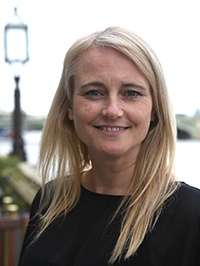Modern slavery should be at the heart of our approach to sustainability. How can we say that we are sustainable if doing business is predicated on the abuse and exploitation of others?
As operators of the UK-wide Modern Slavery Helpline, Unseen is faced with reports of forced labour situations on a daily basis. Often those further up the supply chain are completely unaware of what is happening beneath them because they don’t have any real transparency below their tier one suppliers. When asked, some businesses respond by arguing that the landscape and their operating model is too complicated to give a clear view of what is happening on the ground. In that case, change the operating model or put in place processes to provide the level of assurance needed through key suppliers.
In contrast, businesses who stick their head above the parapet should be applauded for taking a stand against such a complex and ingrained issue. We need to stop shying away from the problem by implementing good practice and robust due diligence in the procurement, award and monitoring of contracts for goods and services and those we sub-contract to. And we need to better educate consumers who have relied for so long on cheap, without a thought for the consequences. The environment has been driven by businesses focused on the age-old principles of an extractive profit model. This needs to be turned on its head and replaced with one that puts all aspects of sustainability at the heart of corporate behaviour.
Whilst we have legal counsels reluctant to engage around transparency and the media hellbent on criticising high street names we are refusing to develop the environment where finding slavery and dealing with it appropriately is rewarded. What is clear is that if you look for it hard enough, you will find it. Let’s get into the habit of naming and faming those who do the right thing when they do find it rather than naming and shaming. The whole premise of the UK’s modern slavery Act was to create a race to the top by encouraging businesses to do more. Maybe the Act requires some fine tuning but it is based on the understanding that onerous and directive requirements will result in one thing – a tick box exercise, not the change in behaviour that is needed.
Investor pressure will continue to grow as more are looking for businesses who are taking the threat of modern slavery seriously and complying with the law. Even our young people are leading the way by demanding that future employers take their responsibilities seriously on all aspects of sustainability, including those related to people! People are at the heart of any business and we must have a zero tolerance to abuse and exploitation by taking the right due diligence steps, at the right time, and minimising the risk of modern slavery infiltrating a business or its supply chains.
Our approach at Unseen is to maximise the leverage of the data we hold about instances of modern slavery, through our Business Helpline Portal. Businesses are provided with real-time information to aid them in understanding hotspots and where forced labour situations may be taking place. Remediation support follows through collaboration with those businesses and wider stakeholders in a confidential environment. Only by sharing what we know can we hope to make a positive difference to the lives of workers trapped in exploitative situations.
We need our Blue Planet moment – our challenge is that, as humans, many of us cannot comprehend why someone would get into, let alone stay in a situation of exploitation. The answer is clear – psychological abuse and control exercised over someone who is vulnerable. If we are complacent, modern slavery will continue to thrive with little consequence for those who exploit but terrible lifelong outcomes for those who are abused.
This year’s Sustainable Retail Summit provides the perfect forum for discussion on how we can come together to tackle this important issue. I hope to see you in Berlin this October to continue the conversation.
This post was written and contributed by:
Justine Currell
Executive Director
Unseen

